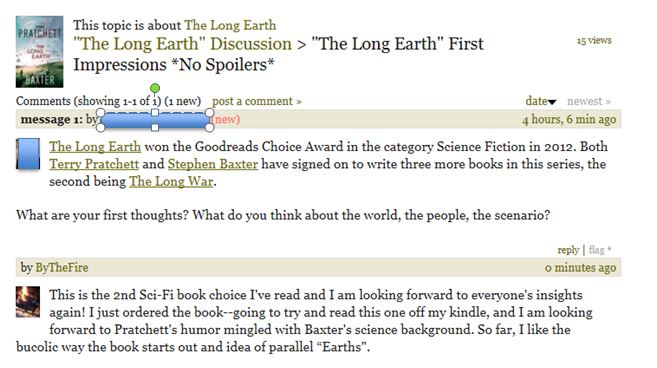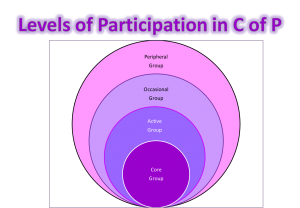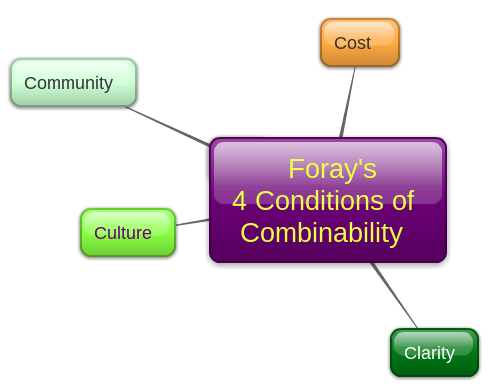Category: Post Feed
Tags: Andrew Simmons, Clay Shirkey, D.E. Gray, Dan Sullivan, Doctoral Assignments, Douglas Adams, Etienne Wenger, George Couros, Goodreads, Helen Teague, Henry Jenkins, Joe Gerstandt, Jose van Dijick, Marshall McLuhan, Nicholas Carr, Paul Sparks, Sherry Turkle, Stephen Baxter, Terry Pratchett, The Long Earth
Disclaimer: This post is part of course requirements following this assignment: Extend your identity in the direction of your career path and participate in a new online community. Interact online using your projected identity for at least six weeks. Think deeply about identity and learning and blog twice a week about your experience. Take time to analyze the meaning, power, and constraints of the community on your learning. ~~~~
Week 6, Post 2
My online group chose The Long Earth as its December book choice. Its authors are Terry Pratchett and Stephen Baxter and it received the Goodreads’ Choice Award in the category Science Fiction in 2012. I found out about the book choice from the weekly emails and discussion forums composed by our Science Fiction and Fantasy Book group’s moderator. Included in the picture below is a sample of our discussion forum, the moderator’s post to seed the discussion, and my response. Within a few minutes of my post, other posts also appeared.

Science fiction book group’s posting with personalized data redacted.
I began this assignment on September 2, 2013. Although uncertain as to the actual path my future work life will take, I knew that it would involve new ideas and that I would somehow help people integrate the change which accompanies new things. On Sunday, August 25, 2013, I made a big change and joined the Science Fiction Writer’s Group. I was warmly received, invited to participate, encouraged in my posts, given book recommendations and even a few plot spoilers. Along the path of this assignments, applications from authors McLuhan, Adams, Carr, Jenkins, Shirkey, and Dijick stood out like freshly dressed soldiers ready for inspection. (a complete list of authors is included below.)
Change is scary. Just watch how the performer Bjork describes her encounter with television:

Change is scary for me too. I discovered that since change is scary for many of us, these gently encouragements served as a cushion to my new experience. Also, the quick replies to my questions and posts from the moderators and group members helped me to move from outsider to peripheral to occasional and almost to active status, as Etienne Wenger predicted in Communities of Practice.

And it all began with Etienne Wenger. Hearing him speak along with his wife was a highlight of this semester. Communities can be achieved in face-to-face settings and online protocols as long as the people within each of them continue to participate.
Thank you for reading these posts! And thank you, Dr. Paul Sparks for these invitations to explore and change!
~~~
Comprehensive Source List:
Adams, D. (1995). The Hitchhiker’s Guide to the Galaxy. Del Rey. Link
Carr, N. (2008). Is google making us stupid? The Atlantic, Retrieved from http://www.theatlantic.com/magazine/archive/2008/07/is-google-making-us-stupid/306868/
Couros, George. The Principal of Change Blog. Retrieved September 15, 2013 Link
Dijck, José van (2013). The culture of connectivity: a critical history of social media. Oxford University Press. Link
Gerstandt, Joe. (2012). Social Gravity: Harnessing the Natural Laws of Relationships [Kindle DX version]. Retrieved from Amazon.com. Link
Gray, D. E. (2009). Doing research in the real world (2nd ed.). Thousand Oaks, California: Sage Publications. Link keywords=Doing+research+in+the+real+world
Jenkins, Henry (2008-09-01). Convergence Culture: Where Old and New Media Collide (Kindle Locations 3040-3041). NYU Press. Kindle Edition. Link
McLuhan, Marshall (1967). The Medium is the Message. Gingko Press Inc. Link
Pratchett, T and Baxter, S. (2012). The Long Earth. Harper Collins. Link
Shirkey, Clay. (2010). Cognitive Surplus How Technology Makes Consumers Into Collaborators. Penguin Books. Link
Shirkey, Clay (2010). How cognitive surplus will change the world | Video on TED.com. Retrieved from http://www.ted.com/talks/clay_shirky_how_cognitive_surplus_will_change_the_world.html
Simmons, A. (2013). Facebook has transformed my students’ writing—for the better. The Atlantic, Retrieved from http://www.theatlantic.com/education/archive/2013/11/facebook-has-transformed-my-students-writing-for-the-better/281563/
Sullivan, D. (2013, September 26). [Lurkers And Superfans: Why You Need Both In Your Facebook Communities]. Retrieved from http://allfacebook.com/crowdly-dan-sullivan-superfans-lurkers_b125468
Turkle, Sherry (2012). Alone Together: Why We Expect More from Technology and Less from Each Other. Basic Books; First Trade Paper Edition edition. Link
Wasko, Molly McLure and Faraj, Samur (2000). It is what one does: why people participate and help others in electronic communities of practice. The Journal of Strategic Information Systems, Volume 9, Issues 2–3, September 2000, Pages 155–173.
Wenger, E. (1998). Communities of practice, learning, meaning, and identity. (1st ed. ed.). Cambridge University Press. Link
See all posts











